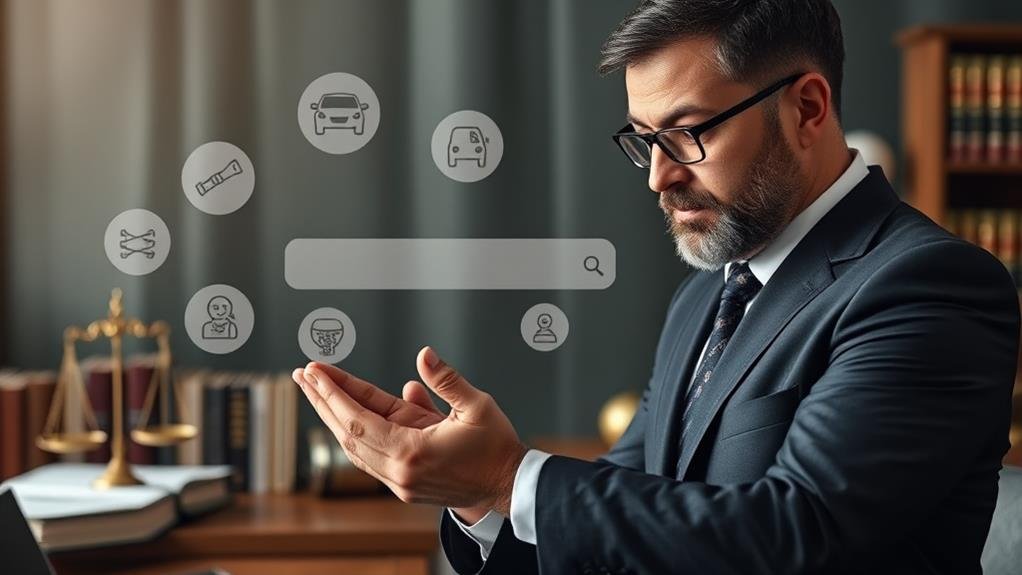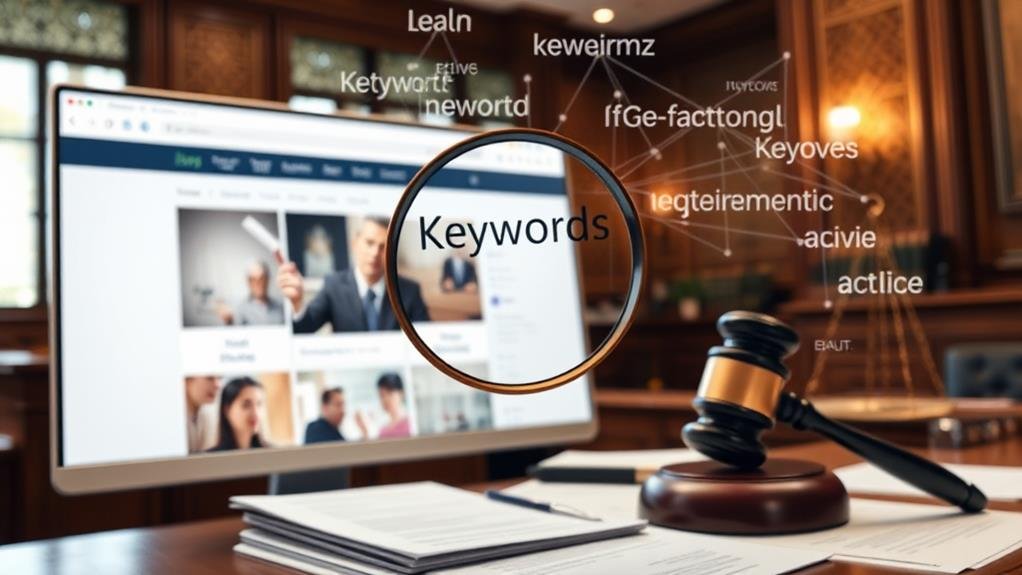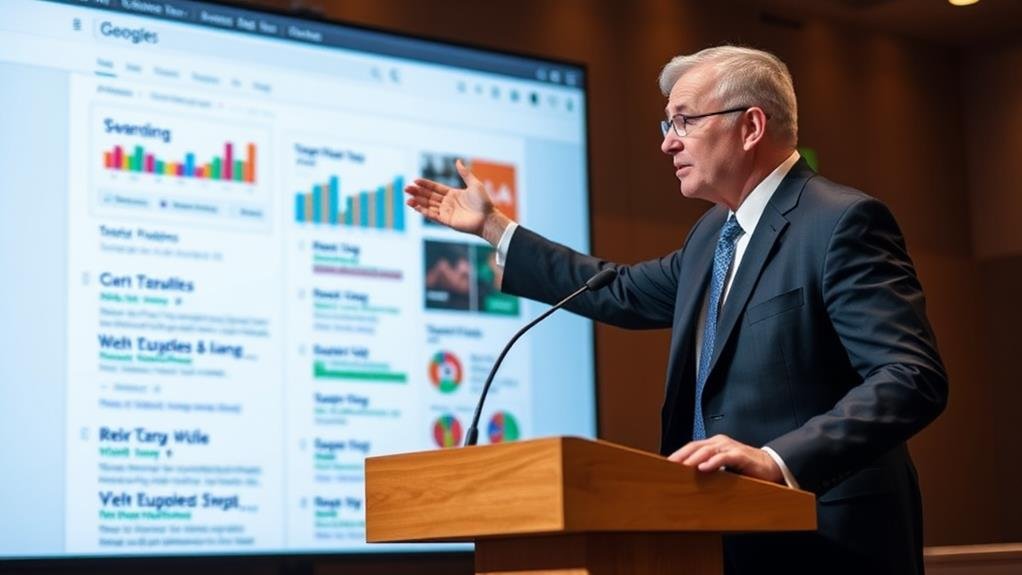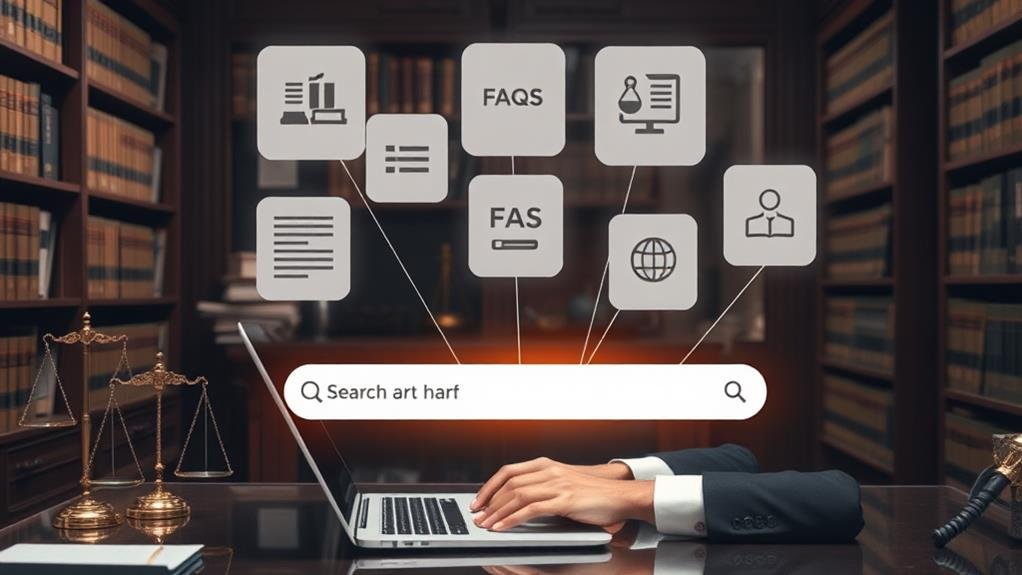Personal injury law firm SEO helps lawyers get more clients online. It focuses on making a law firm’s website appear when people search for help after an accident. This includes using the right words on the website, creating helpful content, and ensuring the site works well on phones. Local SEO is essential because most people look for lawyers nearby.
Firms can improve their local SEO by writing about common legal questions, sharing success stories, and getting good reviews from clients. Videos and images can also make the website more engaging. Proper local SEO for criminal attorney can make a big difference in attracting potential clients. Boost Google Rankings and Reputation With SoTellUs
Key Points
- Optimize website content with targeted keywords like “personal injury lawyer” and location-specific terms.
- Implement local Strategies for personal injury lawyers, including Google Business Profile optimization and local directory listings.
- Create high-quality, informative content addressing common legal questions and recent law changes.
- Utilize on-page personal injury law firm SEO techniques, including optimized title tags, meta descriptions, and internal linking.
- Conduct thorough keyword research using tools like Google Keyword Planner, SEMrush, and Ahrefs.
Definition and Scope of Personal Injury Law Firm SEO
Personal injury law firm SEO is a specialized subset of search engine optimization designed specifically for law firms and attorneys practicing personal injury law. It focuses on improving a law firm’s visibility in search engine results when potential clients seek legal help after an accident or injury. This type of personal injury law firm SEO uses strategies customized to the legal industry and personal injury cases.
The scope of personal injury law firm SEO includes optimizing website content, building quality backlinks, and improving local search presence. It often involves using keywords like “personal injury lawyer” and “personal injury law firm near me” in website text and metadata. Advanced techniques may incorporate legal AI SEO and NLP-based legal marketing to understand better and match user intent.
Personal injury law firm SEO also considers semantic and local SEO, which helps law firms appear in relevant search results even when exact keywords aren’t used. This approach improves the chances of reaching potential clients who may not know the exact legal terms for their situation. By focusing on these specific strategies, personal injury law firms can increase their online visibility and attract more qualified leads.
Personal Injury SEO refers to the process of optimizing a law firm’s website and online presence to rank higher in search engines for personal injury-related keywords. It involves various strategies such as keyword research, content creation, on-page optimization, and link building, all tailored to attract clients searching for personal injury legal services.
Building on the foundation of personal injury law firm SEO, we can now investigate its core components and strategies. personal injury law firm SEO focuses on making a law firm’s website show up higher in search results when people seek help with injuries. This helps more potential clients find the law firm online.
Key parts of personal injury SEO include:
- Keyword research: Finding words people use to search for injury lawyers.
- Content creation: Writing helpful articles about personal injury topics.
- On-page optimization: Making sure each web page is set up correctly for search engines.
- Link building: Getting other websites to link to the law firm’s site.
These strategies work together to improve a personal injury lawyer’s online visibility. By using the right keywords, creating good content, and building links, an injury law firm can attract more clients who need legal help.
Personal injury law firm SEO is different from general legal industry SEO because it focuses on specific injury-related topics. This targeted approach helps personal injury attorneys stand out in search results and connect with people who need their services.
Importance of Local SEO for Personal Injury Lawyers

Three key factors make local SEO for criminal attorney crucial for personal injury law firms. Initially, most people look for a “personal injury lawyer near me” when they need help. They want someone close by who can meet in person. Secondly, local SEO helps law firms show up in map results. This is significant because many people use their phones to find “accident lawyers near me” right after an incident. Third, it’s easier to rank for local terms than national ones, giving smaller firms a chance to compete.
To improve local SEO for criminal attorney, law firms should claim their Google Business Profile. They should add phrases like “local personal injury lawyer” to their website and online listings. Offering a “personal injury lawyer free consultation” can attract more clients. They should also get reviews from happy clients and list their business in local directories.
Law firms can create content about local laws and events. They should mention nearby hospitals and courts. Adding a “personal injury attorney consultation” page can help too. By focusing on local SEO for criminal lawyers, personal injury law firms can reach more potential clients in their area.
Local SEO for criminal lawyers is crucial for personal injury law firms because most clients search for legal services within their geographic area. By optimizing for local searches, law firms can appear in local search results, Google Maps, and business listings, increasing the likelihood of attracting nearby clients.
Personal injury law firm SEO serves as a vital lifeline for personal injury law firms seeking to connect with potential clients in their immediate vicinity. When people need legal help after an injury, they often search for a “personal injury lawyer near me” or “personal injury attorney near me.” By optimizing for these local searches, law firms can appear in Google Maps and local business listings, making it easier for potential clients to find them.
To enhance local SEO, firms should focus on getting positive reviews from clients. These reviews help elevate the firm’s reputation and can lead to higher rankings for searches like “best personal injury lawyer.” It’s also essential to include location-specific keywords on the firm’s website and online directories.
Another key personal injury law firm SEO strategy is to create content that addresses local issues and concerns. This can help the firm appear in search results for queries like “affordable personal injury lawyer” in their area. By consistently updating their online presence with local information, personal injury law firms can increase their visibility to nearby clients who need their services.
Keyword Research and Strategies For Personal Injury Lawyers

How can personal injury law firms identify the most effective keywords for their personal injury law firm SEO strategy? The process begins with thorough keyword research. List common terms potential clients might use, like “personal injury lawyer” or “accident attorney.” Then, expand this list using keyword tools to find related phrases and variations.
Keyword clustering for law firms involves grouping similar keywords. This helps create focused content around specific topics. For example, cluster keywords related to car accidents or workplace injuries.
Voice search SEO for law firms is becoming more significant. Include natural language phrases people might speak, such as “What should I do after a car accident?”
Implement a semantic SEO strategy for personal injury by focusing on topics rather than just keywords. This approach covers related concepts and answers common questions in your content.
Lastly, perform keyword intent analysis for law firms. Understand if searchers want information, to hire a lawyer, or to compare services. This helps tailor your content to match user needs and improve your chances of ranking well in search results.
Identifying Effective Keywords for Personal Injury Law
When identifying effective keywords for personal injury law firm SEO, it’s crucial to focus on terms that potential clients are likely to use when searching for legal assistance. Start by brainstorming common phrases related to accidents and injuries. For example, “personal injury lawyer” is a popular search term.
Next, think about specific types of cases. “Car accident attorney” is often used by people looking for help after a crash. “Injury claim lawyer” is another useful keyword for those seeking compensation.
Use tools like Google Keyword Planner to find related terms and check their search volume. Look for keywords with high search volume but low competition. “Best accident lawyer” might be a good target if it’s not too competitive.
Consider local SEO keywords for your personal injury law firm SEO. Add your city or state to keywords to target nearby clients. For example, “personal injury lawyer [your city]” can help you show up in local searches.
Effective keywords for personal injury law include terms that potential clients are likely to use when seeking legal representation, such as “car accident lawyer,” “personal injury attorney,” or “workplace injury legal help.” Identifying high-intent keywords can drive more relevant traffic to the site

Effective keyword selection forms the foundation of successful SEO for personal injury law firms. When choosing keywords, focus on terms that potential clients are likely to use when searching for legal help. For example, “personal injury lawyer” and “car accident lawyer” are common searches. These keywords show that someone is actively looking for legal representation.
Other effective keywords include “workplace injury lawyer,” “accident injury attorney,” and “personal injury claims lawyer.” These terms are specific and indicate a high intent to find legal assistance. You can attract more relevant visitors by using these keywords on your website and in your content.
To find the best keywords, think about the different types of cases you handle. Then, imagine what someone might type into a search engine if they needed help with that kind of case. Use tools like Google Keyword Planner to see how often people search for these terms.
Long-Tail vs. Short-Tail Keywords
When choosing keywords for personal injury law firm SEO, it’s essential to understand the difference between long-tail and short-tail keywords. Long-tail keywords are specific phrases with three or more words, like “best personal injury lawyer in New York,” which are easier to rank for but have lower search volume. Short-tail keywords, such as “personal injury lawyer,” are more general and have higher search volume, but they’re also more competitive and harder to rank for in search results.
Long-Tail Keywords: Phrases with three or more words, such as “best personal injury lawyer in New York.” These are more specific and often easier to rank for
Long-tail keywords often have less competition, making it easier for firms to rank higher in search results. They also tend to attract more qualified leads, as searchers using these terms are usually closer to making a decision. Some effective long-tail keywords for personal injury lawyers include “top-rated injury attorney for car accidents” or “experienced injury lawyer specializing in workplace accidents.”
To use long-tail keywords effectively, law firms should:
- Research common questions potential clients ask
- Include location-specific terms
- Use natural language in website content
- Create separate pages for different practice areas
- Optimize meta descriptions and title tags
Short-Tail Keywords: General and highly competitive phrases like “personal injury lawyer.” These have high search volume but are more difficult to rank for
Short-tail keywords represent the broad, highly competitive search terms that personal injury law firms often target in their personal injury law firm SEO strategies. These keywords, like “personal injury lawyer” or “best injury attorney,” have high search volumes but are harder to rank for. Many people use these simple terms when looking for legal help.
While it’s tempting to focus on short-tail keywords, they present challenges. The competition is fierce, with many established firms already ranking well for these terms. It’s hard for newer or smaller firms to stand out.
However, short-tail keywords can still be useful. They help build comprehensive website authority and can drive significant traffic if you manage to rank well. To use them effectively:
- Include them in your main pages and headers
- Create high-quality content around these terms
- Use them naturally in your text, not just for personal injury law firm SEO
- Pair them with location-specific terms, like “experienced personal injury lawyer in [city]”
- Track your rankings and adjust your strategy as needed
Tools for Keyword Research

Several powerful tools are available to personal injury law firms for conducting thorough keyword research. These tools help lawyers find the right words to use on their websites and in their online content.
One popular tool is Google Keyword Planner. It shows how often people search for specific words and phrases. Another useful tool is SEMrush, which helps find keywords your competitors are using. Ahrefs is great for seeing which keywords your website already ranks for.
For more advanced techniques, personal injury law firms can use natural language processing (NLP) tools. These tools help us understand how people talk about legal issues. RankBrain, Google’s AI system, uses NLP to better match search queries with relevant content.
Schema markup is another crucial tool for lawyers. It helps search engines understand your website’s content better. This can lead to better rankings and more visibility in search results.
Popular tools for conducting keyword research include
Several popular tools can help personal injury law firms conduct effective keyword research. Google Keyword Planner is a free option that provides search volume data and keyword suggestions. Paid tools like Ahrefs, SEMrush, and Moz Keyword Analyzer offer more advanced features, including competitor analysis and keyword difficulty scores. These tools can help law firms identify important keywords to target in their personal injury law firm SEO efforts.
Google Keyword Planner
Google Keyword Planner stands out as a powerful and free tool for conducting keyword research in personal injury law firm SEO. This tool helps legal experts for personal injury find the right keywords to target in their online marketing efforts. To use it, you need a Google Ads account, but you don’t have to run ads to access the planner.
When you open Google Keyword Planner, you can enter terms related to personal injury lawyer services. The tool will show you how often people search for these terms and how much competition there is for them. For example, you might realize that “accident injury lawyer” is searched more often than you thought.
The planner also suggests related keywords you might not have considered. This can give you new ideas for content on your law firm’s website. It’s essential to look for keywords with a good balance of search volume and competition. This way, you can find terms that are easier to rank for in personal injury law firm SEO.
Remember to focus on local keywords too, as many people search for lawyers in their area. Google Keyword Planner can help you find these local terms.
Ahrefs
While Google Keyword Planner offers significant comprehension, Ahrefs stands out as another powerful tool for conducting keyword research in personal injury law firm SEO. This tool provides comprehensive understandings into keywords, backlinks, and competitor analysis. Ahrefs helps lawyers find relevant keywords and understand their difficulty and search volume.
For entity optimization for personal injury law firm SEO, Ahrefs can identify related topics and entities in your niche. It also supports latent semantic indexing for law by showing semantically related keywords. This helps create content that covers topics thoroughly. The tool’s features align with machine learning SEO strategy, as it uses advanced algorithms to suggest keywords and content ideas.
Ahrefs can help with knowledge graph SEO for attorneys by revealing how topics are connected. It shows which websites rank for specific keywords, helping you understand Google’s knowledge graph. For structured data and local SEO, Ahrefs can identify opportunities to implement schema markup by analyzing top-ranking pages in your niche.
SEMrush
SEMrush provides significant perspectives into competitor strategies, allowing firms to see what keywords other successful lawyers are targeting. It also offers data on search volumes and keyword difficulty, helping you choose terms that are both popular and achievable.
For personal injury case lawyers, SEMrush can identify long-tail keywords related to specific types of claims, such as “car accident compensation” or “workplace injury lawsuit.” This helps attract more targeted traffic to your website.
The tool’s site audit feature can help identify and fix technical SEO and local SEO issues, improving your chances of ranking higher for terms like “best lawyer for personal injury claim.” SEMrush also offers content optimization suggestions, ensuring your web pages address the personal injury claims process effectively and thoroughly.
Moz Keyword Explorer
Moz Keyword Investigator stands as a powerhouse among popular keyword research tools for personal injury law firms. This tool helps lawyers find the best words to utilize on their websites and in their online ads. It shows how many people search for specific terms like “personal injury lawyer los angeles” or “auto accident attorney” each month.
The tool also tells you how challenging it is to rank for these words on Google. This assists lawyers in choosing keywords they can actually compete for. Moz Keyword Explorer provides ideas for related terms, like “injury lawsuit lawyer,” which can help broaden a law firm’s reach.
It’s especially useful for new trends in online marketing. For example, it can help find keywords related to “chatbot lawyer marketing” or “voice search personal injury SEO.” These are crucial as more people use voice assistants and chatbots to find legal help.
Lawyers can use Moz to see what words their competitors are utilizing. This helps them come up with better strategies to stand out online. By using Moz Keyword Explorer, personal injury lawyers can enhance their websites and attract more clients.
On-Page Optimization Techniques

On-page optimization techniques form the foundation of effective personal injury law firm SEO. These methods help your website rank better in search results. Start by choosing the right keywords. For example, “personal injury lawyer Chicago” or “serious injury lawyer” can be good choices. Use these keywords in your page titles, headings, and content.
Make sure your website is easy to read and maneuver. Use clear headings and short paragraphs. Include significant information about your services, like handling insurance claims or liability cases. An “injury compensation lawyer” should explain how they help clients get fair compensation.
Don’t forget about your website’s speed and mobile-friendliness. Search engines prefer fast, mobile-friendly sites. Use images and videos to make your content more engaging, but optimize them for quick loading. Remember to add alt text to images for better accessibility.
Create unique, helpful content for your visitors. This could include blog posts about common personal injury cases or FAQs about working with an “insurance claim lawyer”. By focusing on these on-page techniques, you’ll improve your chances of ranking higher in search results.
Best Practices for On-Page Local SEO
Implementing best practices for on-page SEO for criminal lawyers is crucial for personal injury law firms to boost their online visibility and attract potential clients. Start by optimizing your page titles and meta descriptions. Include relevant keywords like “personal injury lawyer Houston” or “personal injury lawyer Miami” in these elements. Make certain your content is easy to read and understand. Use headings and subheadings to break up text and help search engines comprehend your content better.
Use internal links to connect related pages on your website. This helps visitors and search engines find significant information. Include location-specific keywords like “personal injury lawyer Dallas” or “personal injury lawyer Philadelphia” in your content when appropriate. Make certain your website loads quickly and works well on mobile devices.
Pay attention to Google’s BERT algorithm when creating content. Focus on natural language and answering user questions clearly. Use alt text for images to improve accessibility and personal injury law firm SEO. Keep your content fresh and up-to-date. Regularly review and update your pages to guarantee they provide accurate and helpful information. By following these best practices, personal injury law firms can improve their chances of ranking higher in search results.
On-page SEO for criminal lawyers focuses on optimizing individual pages for specific keywords. Best practices include using relevant keywords in headings, incorporating internal linking, and maintaining a logical URL structure

Building upon the general best practices, let’s focus on specific on-page personal injury law firm SEO strategies for personal injury law firms. When optimizing your website pages, use keywords like “personal injury lawyer Atlanta” or “car accident compensation lawyer” in your headings and content. These help search engines understand what your page is about.
Make sure your URLs are easy to read and include relevant keywords. For example, use “www.yourfirm.com/injury-claim-assistance” instead of a jumbled string of numbers and letters. This helps both search engines and users.
Internal linking is essential. Link to other relevant pages on your site, like connecting your “accident claims attorney” page to your “lawyer for personal injury claim” page. This helps visitors and search engines traverse your site better.
Use descriptive alt text for images, including keywords when appropriate. Write clear, helpful content that answers common questions your clients might have. Make sure your pages load quickly and work well on mobile devices.
Remember to update your content regularly and keep it accurate. This shows search engines that your site is active and reliable.
Importance of Title Tags and Meta Descriptions
Meta descriptions are short summaries of your page content. They appear below the title tag in SERPs and should be around 155-160 characters. Include relevant keywords and a call-to-action. A personal injury lawyer in San Francisco could use: “Injured in an accident? Our San Francisco personal injury lawyers can help. Free case evaluation. Call now!”
Both elements are vital for improving click-through rates from search results. They should accurately represent your page content and entice users to click. As AI-driven personal injury law firm SEO for law firms becomes more common, it’s significant to regularly update and optimize these elements. This applies to all locations, including Phoenix and Boston, to guarantee maximum visibility in local search results.
Title tags and meta descriptions are critical for attracting clicks from search results and legal advertising in personal injury law firm SEO like any other. They should include the target keyword and provide a concise, compelling description of the page content

Title tags and meta descriptions stand out as critical elements in attracting clicks from search engine results pages (SERPs). These snippets give users a quick preview of your webpage content. For a personal injury lawyer in Seattle, it’s vital to craft persuasive tags and descriptions that include relevant keywords.
When writing title tags, keep them under 60 characters. Include your main keyword, like “car crash lawyer” or “serious accident lawyer,” near the beginning. Make sure it accurately describes the page content.
Meta descriptions should be around 155-160 characters. Use this space to provide a brief, engaging summary of what users will find on your page. Include keywords like “accident compensation lawyer” or “negligence lawyer” naturally in the text.
Both elements should be unique for each page on your website. Avoid duplicate content, as this can hurt your personal injury law firm SEO efforts. Remember to write for humans, not just search engines. Your goal is to entice users to click on your link in the search results.
Content Relevance and Quality
Central to successful SEO for personal injury law firms lies content relevance and quality. To rank well, your website needs good information that helps people. Write about topics like “personal injury lawyer las vegas” or “car wreck lawyer” that your clients search for. Make sure your content answers their questions clearly.
Your articles should be easy to read and understand. Use simple words and short sentences. Talk about things like “accident injury compensation” and “insurance settlement lawyer” in a way that explains them well. This helps both people and search engines know what your page is about.
Keep your content fresh and up-to-date. Write new articles often. You can even talk about new things like “conversational ai in legal marketing” to show you’re keeping up with trends. But always focus on what your clients need to know most.
Search engines prioritize content that is relevant, informative, and of high quality. For personal injury law firms, providing clear answers to legal questions, case examples, and valuable insights can enhance rankings

Search engines have become increasingly sophisticated in evaluating content quality and relevance. For personal injury law firms, this means creating content that truly helps potential clients. A personal injury lawyer should focus on answering common questions clearly. For example, explain what to do after a car accident or how to file a medical malpractice claim.
Good content includes real case examples. A slip and fall lawyer might share stories of successful settlements, helping readers understand their rights. A wrongful death lawyer could explain the legal process, making complex ideas simple for families in need.
Use natural language generation for law firms to create more content, but always review it for accuracy. Write about local laws and recent changes that affect your practice area. Provide step-by-step guides for dealing with insurance companies or gathering evidence.
Remember to update your content regularly. Search engines like fresh, accurate information. By consistently offering useful perspectives, your law firm’s website can become a trusted resource. This approach not only helps with personal injury law firm SEO but also builds trust with potential clients.
Content Creation and Marketing
Content creation and marketing are foundational elements of a successful personal injury law firm SEO strategy for personal injury law firms. To enhance your online visibility, focus on creating high-quality content that answers common questions and addresses specific legal issues. For example, if you’re a personal injury lawyer for elderly clients, write articles about slip and fall accidents in nursing homes or senior-related car accident injuries.
Use natural language processing (NLP) legal content creation techniques to make your writing more conversational and easy to understand. This approach helps with voice optimization for lawyer marketing, as more people use voice search to find legal help. Implement topic modeling for legal SEO by grouping related content together, like articles about car accidents, workplace injuries, or medical malpractice.
When writing about sensitive topics like pain and suffering, use clear, compassionate language. Explain legal concepts in simple terms, avoiding jargon. Share real-life case examples to illustrate your points. Remember to update your content regularly and promote it through social media, email newsletters, and legal directories to reach a wider audience and elevate your search engine rankings.
Creating Compelling Content that Ranks Well

Crafting engaging content that ranks well is a crucial aspect of personal injury law firm SEO. To create persuasive content, focus on topics that matter to your potential clients. For example, a truck accident lawyer might write about common causes of truck accidents and what to do after one occurs. A brain injury lawyer could explain the symptoms and long-term effects of traumatic brain injuries.
Use clear, simple language that anyone can understand. Break complex legal concepts into easy-to-digest information. Include real-life examples or case studies to make your content more relatable. For a catastrophic injury lawyer, this might mean sharing stories of how they’ve helped clients recover after severe accidents.
Optimize your content for search engines by naturally including relevant keywords. A traumatic brain injury lawyer could use phrases like “TBI symptoms” or “brain injury treatment” throughout their articles. Remember to use headers, bullet points, and short paragraphs to make your content easy to read.
Regularly update your content with fresh information to keep it relevant. A severe injury attorney should stay informed about new laws or medical treatments related to their field and incorporate this knowledge into their content.
To rank well, content should address the needs of potential clients, offer solutions to common legal problems, and demonstrate the firm’s expertise. Including client testimonials, case studies, and informative blog posts can boost credibility and personal injury law firm SEO performance
To improve a personal injury law firm’s online presence, content must connect with potential clients’ needs while showcasing the firm’s legal prowess. This means creating articles, blog posts, and web pages that answer common questions and concerns people have after accidents or injuries. For example, a workers’ compensation lawyer could write about the steps to take after a workplace injury. A construction accident lawyer might explain common hazards on building sites and how to stay safe.
To rank well in search results, include keywords like “workplace accident lawyer” or “head injury lawyer” naturally in your content. But don’t just stuff keywords in; make sure the information is helpful and easy to understand. Share real stories of how you’ve helped clients, like a premises liability lawyer explaining a successful slip-and-fall case. Use simple words and short sentences to explain complex legal ideas.
Add client testimonials to your website to build trust. Create case studies that show how you solved tricky legal problems. Write blog posts about new laws or court decisions that affect personal injury cases. This mix of content helps show you’re an expert and can assist potential clients with their legal needs.
Types of Content: Blogs, FAQs, and Service Pages

Law firms can enhance their personal injury law firm SEO by using different types of content on their websites. Blogs are great for talking about new legal topics and answering common questions clients have. FAQs and service pages are also essential, as they provide clear information about the firm’s knowledge and help potential clients find what they need quickly.
Blogs: Useful for addressing trending legal topics, common client questions, and industry updates
Blogs serve as a powerful tool for personal injury law firms to engage potential clients and demonstrate proficiency. They offer a platform to address current legal issues, answer common questions, and share industry news. This content helps potential clients understand their rights and legal options.
For example, a spinal cord injury lawyer could write about new treatments or compensation options. A dog bite lawyer might explain local leash laws and owner liability. A bicycle accident lawyer could discuss safety tips and recent changes in traffic laws. Pedestrian accident lawyers might cover crosswalk rules and common causes of accidents. A broken bone injury lawyer could explain different types of fractures and their impact on daily life.
By regularly updating their blog with relevant content, law firms can:
- Improve search engine rankings
- Establish authority in their field
- Educate potential clients
- Address frequently asked questions
- Share success stories and case outcomes
- Discuss recent legal changes
- Provide helpful resources and links
Blogs should be easy to read, informative, and focused on topics that matter to potential clients. They should avoid legal jargon and explain complex concepts in simple terms.
FAQs: Direct answers to frequently asked questions help improve SEO and user engagement
Through the implementation of Frequently Asked Questions (FAQs) sections, personal injury law firms can greatly improve their personal injury law firm SEO performance and user engagement. FAQs help answer common questions potential clients may have about legal services. This saves time for both the client and the law firm.
When creating FAQs, include questions about different types of cases. For example, “What does a product liability lawyer do?” or “How can a motorcycle accident lawyer help me?” You can also address questions about specific injuries, like “When should I contact a back injury lawyer?” or “Can an emotional distress lawyer help with my case?”
To make FAQs effective for SEO usingfor criminal lawyers:
- Use clear, simple language
- Include relevant keywords naturally
- Keep answers short and to the point
- Update FAQs regularly with new information
FAQs can also help with user engagement. They provide quick answers to visitors’ questions, keeping them on your website longer. This can lead to more potential clients contacting your firm, like those seeking an assault injury lawyer. Remember to organize your FAQs in a way that’s easy to read and traverse.
Service Pages: These should clearly describe the firm’s legal services, including keywords related to each specific service
At the heart of effective personal injury law firm SEO lies well-crafted service pages that clearly articulate the firm’s legal services. These pages are essential for helping potential clients understand what the firm offers and for improving search engine rankings. Each service page should focus on a specific type of personal injury case, such as car accidents, slip and falls, or burn injuries.
When creating a service page for a burn injury lawyer, it’s significant to use relevant keywords throughout the content. This helps search engines understand what the page is about and can improve its visibility in search results. The page should explain what burn injuries are, common causes, and how a lawyer can help victims seek compensation.
Include clear headings and subheadings to organize the information. Use bullet points to list services offered or types of burn injuries handled. Add a call-to-action encouraging visitors to contact the firm for a consultation. Make sure the page loads quickly and is easy to read on mobile devices. By creating informative and well-optimized service pages, personal injury law firms can improve their personal injury law firm SEO and attract more potential clients.
Leveraging Multimedia Content for Engagement
Engagement is the key to capturing potential clients‘ attention in the competitive world of personal injury law. Multimedia content offers a powerful way to enhance engagement on your law firm’s website. By using different media types, you can make your site more interesting and helpful for visitors.
Start by adding high-quality images to your pages. Use visuals of your attorneys, office, and local landmarks to create a personal connection. Next, consider creating short videos that explain common legal terms or processes. These can help potential clients understand your services better.
Infographics are another beneficial tool. They can present complex information in an easy-to-understand format. For example, you could create an infographic showing the steps in a personal injury case.
Don’t forget about audio content. Podcasts or recorded client testimonials can add a human touch to your site. These allow visitors to hear real voices and stories, which can be more convincing than text alone.
Lastly, interactive elements like quizzes or calculators can engage visitors and provide significant information. For instance, a quiz about common personal injury myths can educate potential clients while keeping them on your site longer.
Incorporating multimedia such as videos, infographics, and podcasts can enhance user engagement and keep visitors on the site longer, improving SEO performance

Multimedia integration serves as a powerful tool for enhancing user engagement and improving Personal injury law firm SEO performance on personal injury law firm websites. By adding videos, infographics, and podcasts, law firms can make their content more interesting and easier to understand. Videos can show how accidents happen or explain legal processes. Infographics can break down complex information into simple, visual formats. Podcasts allow people to listen to legal advice while doing other things.
These multimedia elements keep visitors on the site longer, which is good for personal injury law firm SEO. Search engines like Google notice when people spend more time on a website. This tells them the site has significant content. As a result, the website may rank higher in search results. To use multimedia effectively, law firms should:
- Create short, informative videos about common legal issues
- Design eye-catching infographics with essential statistics
- Start a podcast series discussing different aspects of personal injury law
- Make sure all multimedia content is mobile-friendly
- Include transcripts for videos and podcasts to help with personal injury law firm SEO
Technical SEO Enhancements
Beyond content creation, technical SEO improvements play a crucial role in boosting a personal injury law firm’s website visibility and performance. These upgrades focus on the site’s structure and functionality to help search engines better understand and rank the content.
First, make sure the website loads quickly on all devices. Compress images, minimize code, and use caching to speed up page load times. Next, make the site mobile-friendly with responsive design. This means the site adjusts to fit different screen sizes.
Implement a clear site structure with easy guidance. Use descriptive URLs and create an XML sitemap to help search engines crawl the site effectively. Add schema markup to provide search engines with more information about the content.
Secure the website with HTTPS to protect user data and improve trust. Fix broken links and redirect old pages to maintain site authority. Use header tags (H1, H2, etc.) to organize content logically.
Lastly, optimize meta titles and descriptions for each page. These appear in search results and help users understand what the page is about. By focusing on these technical aspects, a law firm can greatly improve its search engine rankings and user experience.
Ensuring Website Speed and Mobile-Friendliness

While technical personal injury law firm SEO encompasses varied aspects, website speed and mobile-friendliness stand out as vital factors for personal injury law firm websites. These elements directly impact user experience and search engine rankings. To make certain your site loads quickly, compress images and use efficient coding practices. Minimize the use of large files and reduce server response time. Consider using a content delivery network (CDN) to speed up page loading for visitors from different locations.
Mobile-friendliness is similarly significant, as more people use smartphones to search for legal services. Make sure your website is responsive, adapting to different screen sizes. Use larger fonts and buttons for easy reading and tapping on mobile devices. Avoid Flash and pop-ups, which can be problematic on mobile. Test your site using Google’s Mobile-Friendly Test tool to identify areas for enhancement.
Regular performance checks are essential. Use tools like Google PageSpeed Insights to monitor your site’s speed and get suggestions for improvements. Remember, a fast, mobile-friendly website not only pleases visitors but also boosts your chances of ranking higher in search results, potentially attracting more clients to your personal injury law firm.
See More Personal Injury Law Firm Growth
In the digital era, effective SEO for criminal lawyers is essential for personal injury law firms to stand out in a crowded market. Like Hercules conquering the Hydra, firms must tackle multiple aspects of optimization.
Local SEO for criminal lawyers, personal injury law firm SEO, strategic keyword research, engaging multimedia content, and technical improvements are key weapons in this battle. By excelling in these elements, law firms can climb the search engine rankings, attract more clients, and ultimately triumph in the competitive legal environment.

